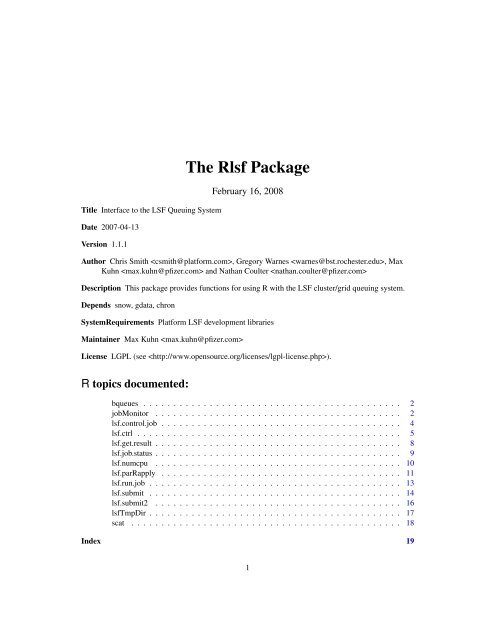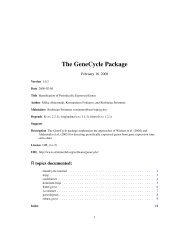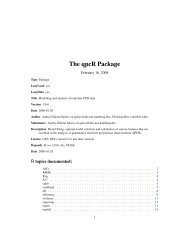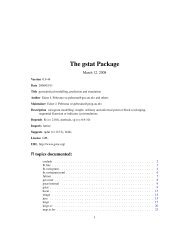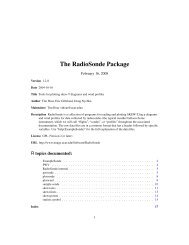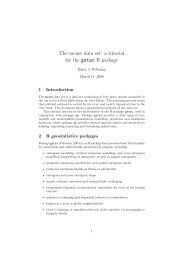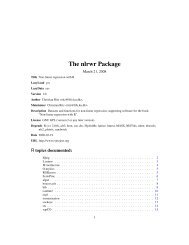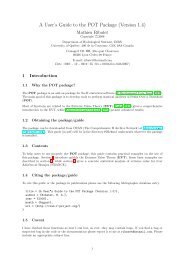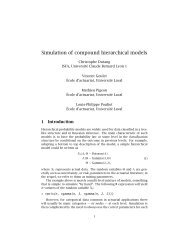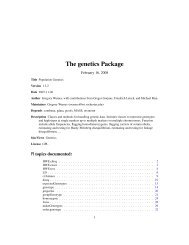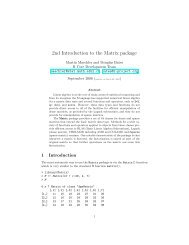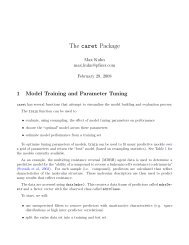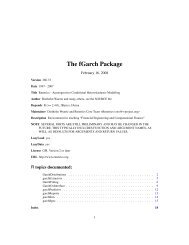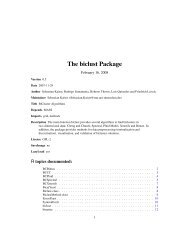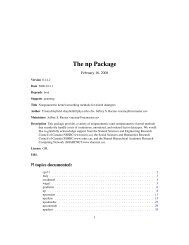The Rlsf Package - NexTag Supports Open Source Initiatives
The Rlsf Package - NexTag Supports Open Source Initiatives
The Rlsf Package - NexTag Supports Open Source Initiatives
Create successful ePaper yourself
Turn your PDF publications into a flip-book with our unique Google optimized e-Paper software.
Title Interface to the LSF Queuing System<br />
Date 2007-04-13<br />
Version 1.1.1<br />
<strong>The</strong> <strong>Rlsf</strong> <strong>Package</strong><br />
February 16, 2008<br />
Author Chris Smith , Gregory Warnes , Max<br />
Kuhn and Nathan Coulter <br />
Description This package provides functions for using R with the LSF cluster/grid queuing system.<br />
Depends snow, gdata, chron<br />
SystemRequirements Platform LSF development libraries<br />
Maintainer Max Kuhn <br />
License LGPL (see ).<br />
R topics documented:<br />
bqueues . . . . . . . . . . . . . . . . . . . . . . . . . . . . . . . . . . . . . . . . . . . 2<br />
jobMonitor . . . . . . . . . . . . . . . . . . . . . . . . . . . . . . . . . . . . . . . . . 2<br />
lsf.control.job . . . . . . . . . . . . . . . . . . . . . . . . . . . . . . . . . . . . . . . . 4<br />
lsf.ctrl . . . . . . . . . . . . . . . . . . . . . . . . . . . . . . . . . . . . . . . . . . . . 5<br />
lsf.get.result . . . . . . . . . . . . . . . . . . . . . . . . . . . . . . . . . . . . . . . . . 8<br />
lsf.job.status . . . . . . . . . . . . . . . . . . . . . . . . . . . . . . . . . . . . . . . . . 9<br />
lsf.numcpu . . . . . . . . . . . . . . . . . . . . . . . . . . . . . . . . . . . . . . . . . 10<br />
lsf.parRapply . . . . . . . . . . . . . . . . . . . . . . . . . . . . . . . . . . . . . . . . 11<br />
lsf.run.job . . . . . . . . . . . . . . . . . . . . . . . . . . . . . . . . . . . . . . . . . . 13<br />
lsf.submit . . . . . . . . . . . . . . . . . . . . . . . . . . . . . . . . . . . . . . . . . . 14<br />
lsf.submit2 . . . . . . . . . . . . . . . . . . . . . . . . . . . . . . . . . . . . . . . . . 16<br />
lsfTmpDir . . . . . . . . . . . . . . . . . . . . . . . . . . . . . . . . . . . . . . . . . . 17<br />
scat . . . . . . . . . . . . . . . . . . . . . . . . . . . . . . . . . . . . . . . . . . . . . 18<br />
Index 19<br />
1
2 jobMonitor<br />
bqueues<br />
Displays information about queues<br />
Description<br />
Usage<br />
Details<br />
Value<br />
This function parses the command line output of the bqueues command line statement<br />
bqueues()<br />
a system call is used to collect the bqueues output and this is imported into R<br />
a data frame where each row is a queue. <strong>The</strong>re are columns for the number of jobs suspended,<br />
pending, running etc. <strong>The</strong>re is also a column, ratio, that is the logit of the ratio of non-active jobs<br />
(pending or suspended) out of all the jobs.<br />
Author(s)<br />
Max Kuhn<br />
jobMonitor<br />
Management of one or more <strong>Rlsf</strong> jobs<br />
Description<br />
This function will monitor and manage jobs submitted using lsf.submit or lsf.submit2.<br />
Usage<br />
jobMonitor(x, pause = 1, timeLimit = TRUE, buffer = 20, verbose = TRUE)<br />
Arguments<br />
x<br />
pause<br />
timeLimit<br />
buffer<br />
verbose<br />
a list. For one job, it can be the object produced by lsf.submit or lsf.submit2.<br />
When there are multiple jobs, x should be a list of objects resulting from either<br />
of these two functions<br />
the number of seconds to pause before checking the results again<br />
a logical: should the function kill jobs that are taking an inordinate amount of<br />
time? (see details below)<br />
a multiplier to create a failsafe time when timeLimit = TRUE.<br />
a logical: should updates be printed?
jobMonitor 3<br />
Details<br />
This function will check to see if jobs are completed (either with return codes of "DONE" or<br />
"EXIT"). Once a job is finished, the results are immediately obtained using lsf.get.result.<br />
If x contains more than one job, the results of all of the jobs are returned in a list; otherwise the<br />
results are returned directly.<br />
<strong>The</strong> option timeLimit = TRUE is useful for cases where very similar jobs are being run, such<br />
as bootstrapping or cross-validation. In this case, the monitor will wait until half of the jobs are<br />
finished and when will estimate a "failsafe" for the remaining jobs. the failsafe takes the maximum<br />
execution time of the finished jobs and multiplies it by buffer. If the elapsed time for any of the<br />
remaining jobs exceeds this limit, they are killed.<br />
If all of the jobs are done before jobMonitor is called, the failsafe is set to 0.1 (days).<br />
Value<br />
When x contains more than one call to lsf.submit or lsf.submit2 the output is a list of the<br />
results for each job; otherwise it is the result of the single job.<br />
If the job is killed by jobMonitor, it will return the string "killed due to excessive run time"<br />
Author(s)<br />
Max Kuhn<br />
See Also<br />
lsf.submit and lsf.submit2<br />
Examples<br />
test
4 lsf.control.job<br />
lsf.control.job<br />
Control a job that was submitted to LSF<br />
Description<br />
Usage<br />
Manage a job which has been previously submitted to LSF using the lsf.submit function. Control<br />
actions include the termination of the job, the suspension of a running job, and the resumption<br />
of a suspended job.<br />
lsf.kill.job(job)<br />
lsf.suspend.job(job)<br />
lsf.resume.job(job)<br />
Arguments<br />
job<br />
<strong>The</strong> list returned from a previous call to lsf.submit<br />
Details<br />
Value<br />
Note<br />
lsf.kill.job will ask LSF to terminate a job that was previously submitted using lsf.submit.<br />
lsf.suspend.job will ask LSF to suspend a job (i.e. send it a stop signal) that was previously<br />
submitted using lsf.submit.<br />
lsf.resume.job will ask LSF to resume a job that had previously been suspended using the<br />
lsf.suspend.job function.<br />
Returns 0 if the control request was sent successfully, and -1 if there was an error sending the<br />
request.<br />
When LSF control functions are called, the call represents a request to take the action. Depending<br />
on the configuration of LSF, the actual action taken is not pre-defined. For example, LSF can be<br />
configured to send a different signal from the default SIGSTOP in order to suspend a job. If this<br />
different signal is sent by LSF, but the job ignores the signal, then the job is not actually stopped.<br />
<strong>The</strong>re are similar configuration overrides for both termination and resumption of jobs.<br />
Author(s)<br />
See Also<br />
Chris Smith 〈csmith@platform.com〉<br />
lsf.submit
lsf.ctrl 5<br />
Examples<br />
# define the function to remotely run<br />
myfunc
6 lsf.ctrl<br />
Arguments<br />
chkpntPeriod = NULL, chkpntDir = NULL, nxf = NULL, xFile = NULL,<br />
preExecCmd = NULL, mailUser = NULL, delOptions = 0, projectName = NULL,<br />
maxNumProcessors = 1, loginShell = NULL, userGroup = NULL, exceptList = NULL,<br />
exclusive = NULL, notifyBegin = NULL, notifyEnd = NULL, restart = NULL,<br />
restartForce = NULL, rerunnable = NULL, chkpnt_copy = NULL,<br />
chkpnt_force = NULL, interactive = NULL, pty = NULL, pty_shell = NULL,<br />
hold = NULL, R = "R")<br />
savelist<br />
packages<br />
dbg<br />
env<br />
tmpPath<br />
jobName<br />
queue<br />
character vector giving the names of local objects that should be copied to each<br />
worker process before computation is started.<br />
List of library packages to be loaded by each worker process before computation<br />
is started.<br />
Nathan<br />
the environment to get teh R objects from<br />
a path where temporary files are stored<br />
a label for the jobs (-J)<br />
the job queue (-q). fo Pfizer, either "immed_single", "immed_multi", "overnight_single",<br />
"overnight_multi" or "asavailable"<br />
askedHosts the machine name -m<br />
resReq a resource string -R<br />
rlimit_cpu<br />
see LSF documentation<br />
rlimit_fsize see LSF documentation<br />
rlimit_data<br />
see LSF documentation<br />
rlimit_stack the service class where the job is run -S<br />
rlimit_core<br />
see LSF documentation<br />
rlimit_rss resident memory size, in kilobytes. see LSF documentation on -M<br />
rlimit_nofile<br />
see LSF documentation<br />
rlimit_open_max<br />
see LSF documentation<br />
rlimit_swap the virtual memory swap limit (in KB) -v<br />
rlimit_run see LSF documentation<br />
rlimit_process<br />
the limit on the number of processes -p<br />
hostSpec the total CPU time for the job -c<br />
numProcessors<br />
see LSF documentation<br />
dependCond a dependency condition for starting the job -w<br />
beginTime the start time for the job in seconds since 00:00:00 GMT, Jan. 1, 1970 -b<br />
termTime the termination deadline for the job in seconds since 00:00:00 GMT, Jan. 1,<br />
1970 -t
lsf.ctrl 7<br />
sigValue<br />
see LSF documentation<br />
inFile a file to get standard input from -i<br />
outFile a file to append standard out to -o<br />
errFile a file to append standard error output to -e<br />
command<br />
see LSF documentation<br />
chkpntPeriod enables checkpoints for a period of time -k<br />
chkpntDir<br />
a directory path for checkpoints-k<br />
nxf a file to copy between th submission host and the execution server -f<br />
xFile a file to copy between th submission host and the execution server -f<br />
preExecCmd a command to execute prior to running the remote job -E<br />
mailUser<br />
delOptions<br />
see LSF documentation<br />
see LSF documentation<br />
projectName assigns the job to the specified project -P<br />
maxNumProcessors<br />
the maximum number of processors to run the job<br />
loginShell initalizes the execution environment using a loginf shell -L<br />
userGroup a user group to associate the job with -G<br />
exceptList<br />
see LSF documentation<br />
exclusive exclusive execution mode -x<br />
notifyBegin<br />
notifyEnd<br />
restart<br />
an email address to send an email to once the process is started; see LSF documentation<br />
on -B<br />
an email address to send an email to once the process is finished; see LSF documentation<br />
on -N<br />
see LSF documentation<br />
restartForce see LSF documentation<br />
rerunnable make the job re-runnable -r<br />
chkpnt_copy<br />
see LSF documentation on lsf_submit(3)<br />
chkpnt_force see LSF documentation on lsf_submit(3)<br />
interactive<br />
pty<br />
pty_shell<br />
see LSF documentation on -I, requires "interactive" argument<br />
see LSF documentation on -Ip, requires "pty" and "interactive"<br />
interactive mode; new jobs cannot be submitted until the current oe is finished<br />
-I<br />
hold suspend the job in PSUP mode -H<br />
R<br />
Value<br />
the command-line call to R (could be an alias or a path)<br />
a list or arguments specified by the function call or the defaults
8 lsf.get.result<br />
Author(s)<br />
Nathan coulter<br />
References<br />
http://www.platform.com/Products/Platform.LSF.Family/Platform.LSF/<br />
Home.htm<br />
lsf.get.result<br />
Get the result of a function run through LSF<br />
Description<br />
Retrieve the function result from the asynchronous execution of an R function through LSF.<br />
Usage<br />
lsf.get.result(job)<br />
Arguments<br />
job<br />
<strong>The</strong> list returned from a previous call to lsf.submit<br />
Details<br />
This function will retrieve the result of the function provided as an argument to lsf.submit.<br />
Since lsf.submit runs asynchronously, the result must be explicitly requested.<br />
Value<br />
This function returns the result of the remote invocation of the func argument to the lsf.submit<br />
call, or will return NULL if there is no result available at the time of the call (the result can only be<br />
retrieved when lsf.job.status returns "DONE".<br />
<strong>The</strong> function is invoked remotely using the try function. If there is an error invoking the submitted<br />
function, an object of class "try-error" containing the error message will be returned.<br />
Author(s)<br />
Chris Smith 〈csmith@platform.com〉<br />
See Also<br />
lsf.submit, lsf.job.status, try
lsf.job.status 9<br />
Examples<br />
# define the function to remotely run<br />
myfunc
10 lsf.numcpu<br />
Examples<br />
# define the function to remotely run<br />
myfunc
lsf.parRapply 11<br />
lsf.parRapply<br />
Apply a function to each row/column of a matrix, using <strong>Rlsf</strong> for parallel<br />
processing<br />
Description<br />
Apply a funtion to each row/column of a matrix, using <strong>Rlsf</strong> for parallel processing<br />
Usage<br />
lsf.parRapply(x, fun, ..., join.method=cbind, njobs,<br />
batch.size=getOption('lsf.block.size'), trace=TRUE,<br />
packages=NULL, savelist=NULL)<br />
lsf.parCapply(x, ...)<br />
lsf.apply.model(fun, matrix, ..., njobs,<br />
batch.size=getOption('lsf.block.size'),<br />
packages = .packages(), savelist = NULL)<br />
Arguments<br />
x,matrix<br />
fun<br />
Data matrix<br />
Function to apply to each row of x<br />
... Additional arguments to fun<br />
join.method<br />
njobs<br />
batch.size<br />
trace<br />
packages<br />
savelist<br />
Funtion used to join together results from each parallel job. **Note: When fun<br />
returns a vector, this needs to be a function that operates on the transpose of the<br />
matrix.<br />
Number of parallel jobs to use.<br />
Number of rows to include in each parallel job. Defaults to the value of options(’lsf.block.size’).<br />
Show progress of computational jobs.<br />
List of library packages to be loaded by each worker process before computation<br />
is started.<br />
Chacacter vector giving the names of local objects that should be copied to each<br />
worker process before computation is started.<br />
Details<br />
lsf.parRapply applies the supplied function to each row of the supplied matrix x. lsf.parCapply<br />
does the same for columnms. lsf.apply.model is a wrapper around lsf.parRapply that<br />
does some extra error checking, has better handling of warnings, and transposes the output to match<br />
users’s expectations.
12 lsf.parRapply<br />
Value<br />
<strong>The</strong> arguments batch.size and njobs are mutually exclusive. If batch.size is set, the data<br />
matrix x into sections of size batch.size. <strong>The</strong> number of sections will determine the number of<br />
jobs.<br />
On the other hand, if numjobs is set, the data matrix x will be divided into numbjobs components<br />
of near equal size.<br />
<strong>The</strong> arguments packages and savelist can be used to properly initialize the worker processes.<br />
A matrix, vector, or list (depending on the value of ’join.method’) containing the result of applying<br />
fun to each row of the matrix x. As each call to fun is wrapped in a try statement, the returned<br />
object may contain try-error objects.<br />
Author(s)<br />
Gregory R. Warnes 〈warnes@bst.rochester.edu〉<br />
See Also<br />
lsf.apply.model, lsf.submit<br />
Examples<br />
#####<br />
## Example of lsf.parRapply<br />
#####<br />
set.seed(12345)<br />
x
lsf.run.job 13<br />
fun
14 lsf.submit<br />
Details<br />
Value<br />
lsf.run.job is a convenience function that provides the ability to synchronously evaluate an R<br />
function through LSF. It is implemented by composing the lsf.submit, lsf.job.status,<br />
and lsf.get.result R functions.<br />
Returns the result of func as evaluated through LSF.<br />
Author(s)<br />
See Also<br />
Chris Smith 〈csmith@platform.com〉<br />
lsf.submit, lsf.job.status, lsf.get.result<br />
Examples<br />
# define the function to remotely run<br />
myfunc
lsf.submit 15<br />
packages<br />
ncpus<br />
debug<br />
List of library packages to be loaded by each worker process before computation<br />
is started.<br />
A number indicating how many cpus should be allocted to the function call.<br />
Used in conjunction with the snow and Rmpi packages (see notes).<br />
An argument which indicates whether function debugging should be turned on.<br />
Details<br />
Value<br />
This function takes an R function plus arguments, and submits the function to run as a batch job<br />
within the LSF distributed queuing environment.<br />
<strong>The</strong> function will store the environment specified in savelist within a temporary Rdata file,<br />
which will then be used on a remote host to restore the R environment for the function call.<br />
Since func is run asynchronously, the result of the lsf.submit is not the result of func. In order<br />
to retrieve the result, the lsf.get.result function must be used. If synchronous execution<br />
is desired, use the lsf.run.job function.<br />
By default, R is invoked as "R". If the environment variable "RLSF_R" is set, its value is used to<br />
invoke R.<br />
jobid<br />
fname<br />
debug<br />
<strong>The</strong> job identifier returned from LSF.<br />
<strong>The</strong> file name of the environment passed to the remote function call.<br />
A boolean flag indicating whether debugging should be turned on or not. If<br />
debugging is turned on, then the standard output and standard error of the remote<br />
R process invocation will be placed in a file named <strong>Rlsf</strong>_job_output.,<br />
where jobid is the same as the LSF job id returned by lsf.submit<br />
Note<br />
When submitting parallel jobs (i.e. ncpus greater than 1), the <strong>Rlsf</strong> package will utilize the snow<br />
and Rmpi packages for managing the parallel job. At this time, no other parallel packages are<br />
supported (e.g. snow with PVM).<br />
Author(s)<br />
See Also<br />
Chris Smith 〈csmith@platform.com〉<br />
lsf.job.status,lsf.get.result, lsf.run.job<br />
Examples<br />
# define some variables<br />
a
16 lsf.submit2<br />
# define the function to remotely run<br />
myfunc
lsfTmpDir 17<br />
Note<br />
When submitting parallel jobs (i.e. ncpus greater than 1), the <strong>Rlsf</strong> package will utilize the snow<br />
and Rmpi packages for managing the parallel job. At this time, no other parallel packages are<br />
supported (e.g. snow with PVM).<br />
Author(s)<br />
Chris Smith 〈csmith@platform.com〉, Max Kuhn 〈max.kuhn@pfizer.com〉 and Nathan Coulter 〈nathan.coulter@pfizer.com〉<br />
See Also<br />
lsf.job.status,lsf.get.result, lsf.run.job<br />
Examples<br />
data(iris)<br />
library(MASS)<br />
ldaJob1
18 scat<br />
Value<br />
a character string containing the path<br />
Author(s)<br />
Max Kuhn<br />
scat<br />
Display debugging text<br />
Description<br />
Usage<br />
If getOption(’DEBUG’)==TRUE, write text to STDOUT and flush so that the text is immediatly<br />
displayed. Otherwise, do nothing.<br />
scat(...)<br />
Arguments<br />
Value<br />
... Arguments passed to cat<br />
NULL (invisibly)<br />
Author(s)<br />
See Also<br />
Gregory R. Warnes 〈warnes@bst.rochester.edu〉<br />
cat<br />
Examples<br />
options(DEBUG=NULL) # makee sure DEBUG isn't set<br />
scat("Not displayed")<br />
options(DEBUG=TRUE)<br />
scat("This will be displayed immediately (even in R BATCH output \n")<br />
scat("files), provided options()$DEBUG is TRUE.")
Index<br />
∗Topic print<br />
scat, 18<br />
∗Topic utilities<br />
bqueues, 1<br />
jobMonitor, 2<br />
lsf.control.job, 3<br />
lsf.ctrl, 5<br />
lsf.get.result, 8<br />
lsf.job.status, 9<br />
lsf.numcpu, 10<br />
lsf.parRapply, 11<br />
lsf.run.job, 13<br />
lsf.submit, 14<br />
lsf.submit2, 16<br />
lsfTmpDir, 17<br />
lsfTmpDir, 17<br />
scat, 18<br />
try, 8<br />
bqueues, 1<br />
cat, 18<br />
jobMonitor, 2<br />
lsf.apply.model, 12<br />
lsf.apply.model (lsf.parRapply),<br />
11<br />
lsf.control.job, 3<br />
lsf.ctrl, 5, 16<br />
lsf.get.result, 2, 8, 14, 15, 17<br />
lsf.job.status, 8, 9, 14, 15, 17<br />
lsf.kill.job (lsf.control.job), 3<br />
lsf.numcpu, 10<br />
lsf.parCapply (lsf.parRapply), 11<br />
lsf.parRapply, 11<br />
lsf.resume.job (lsf.control.job),<br />
3<br />
lsf.run.job, 13, 15, 17<br />
lsf.submit, 2–4, 8, 9, 12, 14, 14, 16<br />
lsf.submit2, 2, 3, 16<br />
lsf.suspend.job<br />
(lsf.control.job), 3<br />
19


